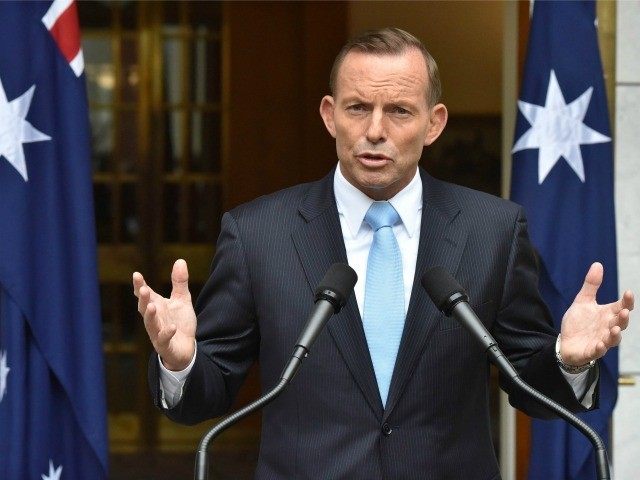Australia’s mobilization against the threat of ISIS has been remarkably swift, relentless, and focused. They are taking very serious measures to deal with potential recruits. For example, AFP reports the Australian government has amended its citizenship laws to “strip dual nationals linked to terrorism of their citizenship for ‘betraying the country.'”
“Prime Minister Tony Abbott said the new powers would apply to dual nationals who fight with or support jihadists such as Islamic State group or so-called lone wolves who pose a threat on home soil,” AFP writes. “But the government backed away from removing citizenship from second-generation Australians. Under that scenario, such nationals linked to terror groups would have been forced to take on the citizenship of their parents’ birth countries.”
Abbott maintained that the new procedures would include copious safeguards, including judicial review, and would be consistent with Australia’s “international legal obligation not to leave a person stateless.”
That’s likely to be a tightrope Australia, and other Western nations, walk with increased delicacy as terrorist recruiting efforts intensify. It seems like common sense to many Westerners that people who want to abandon their mother countries to sign up with a homicidal terror state should be prevented from ever returning to said mother countries, or be granted any considerations based on the citizenship they willfully renounced.
Abbott’s government clearly perceives a wide gulf between knocking out the Australian half of a dual citizenship deal, and effectively exiling native-born Australian jihadis. If the homegrown terror threat continues, the citizens of Western nations might ask, more loudly, why such distinctions should be made.
Abbott declared those who choose to fight with ISIS are “betraying our country and don’t deserve to be citizens of Australia” – a strong statement that has, thus far, been implemented as policy with some delicacy.
Former immigration minister Philip Ruddock went much further when he told The Australian, “I think the government is clearly of the view that people have a need to understand when they take up Australia citizenship or they receive it at birth that if it is possible to lose it, what are the factors that might be important that you understand in terms of civic commitments and particularly adherence to the rule of law.”
AFP notes that the government is disturbed by losing over 100 citizens to the Islamic State, with 30 of them killed while fighting on its behalf. One story in particular has prompted much outrage, at the same time Abbott announced the revised citizenship laws: “Jasmina Milovanov, a 26-year-old Muslim convert, left her children, aged five and seven, with a babysitter earlier this month and never returned.”
Milovanov was apparently radicalized through social media by “jihadi bride recruiter” Zehra Duman, who played off her long-standing dream of “marrying a jihad fighter.” Her husband, who noticed her increasingly extreme Facebook posts and tried to talk her out of falling in with the Islamic State crew, was informed of her defection by a text message she sent from Syria.
Abbott has also been pushing to tighten Australian citizenship tests to “include more questions about allegiance to the country, unifying values, and the rule of law,” according to a report at the Australian. Former immigration minister Ruddock has been tapped as a “special envoy for citizenship and community engagement” to lead the discussion.
“The words of the citizenship pledge must mean something,’’ said Abbott. “This is the discussion we need to have.”
A report at Perth Now adds that the Australian government is considering a “jihadi watch” plan to instruct teachers and students on how to spot potential terrorist recruits.
“Just as parents and families have gained greater understanding of the dangers posed by online sexual predators, there needs to be increased awareness of the threat from online terrorist propaganda,” said Attorney General George Brandis.
Perth Now got a look at a “confidential council briefing paper” that warned of ISIS penetration into Australian schools, concluding that “a national strategy to combat radicalization and extremism in schools is required.”
Teachers and students would be taught to spot telltale signs of radicalization, such as “students drifting away from their friends, running into minor trouble with the law and arguing with those who have different ideological views to their own.” Care was taken to emphasize that other forms of self-destructive and anti-social behavior would also be discussed in the curriculum, not just Islamist terrorism.
The article cites experts who note that simply monitoring young Australians’ social media connections for jihad rhetoric is neither feasible nor 100 percent effective, so friends and family must be mobilized to spot terrorist recruits.
The urgency of the program is highlighted by the fact that four teenage terrorist recruits attended the same school in Melbourne; one of them was shot by Australian police, while another was killed in the Middle East. Things have gotten so bad that “desperate parents fearing their children are planning to join ISIS are asking Australian officials to cancel their passports,” according to Perth Now.

COMMENTS
Please let us know if you're having issues with commenting.